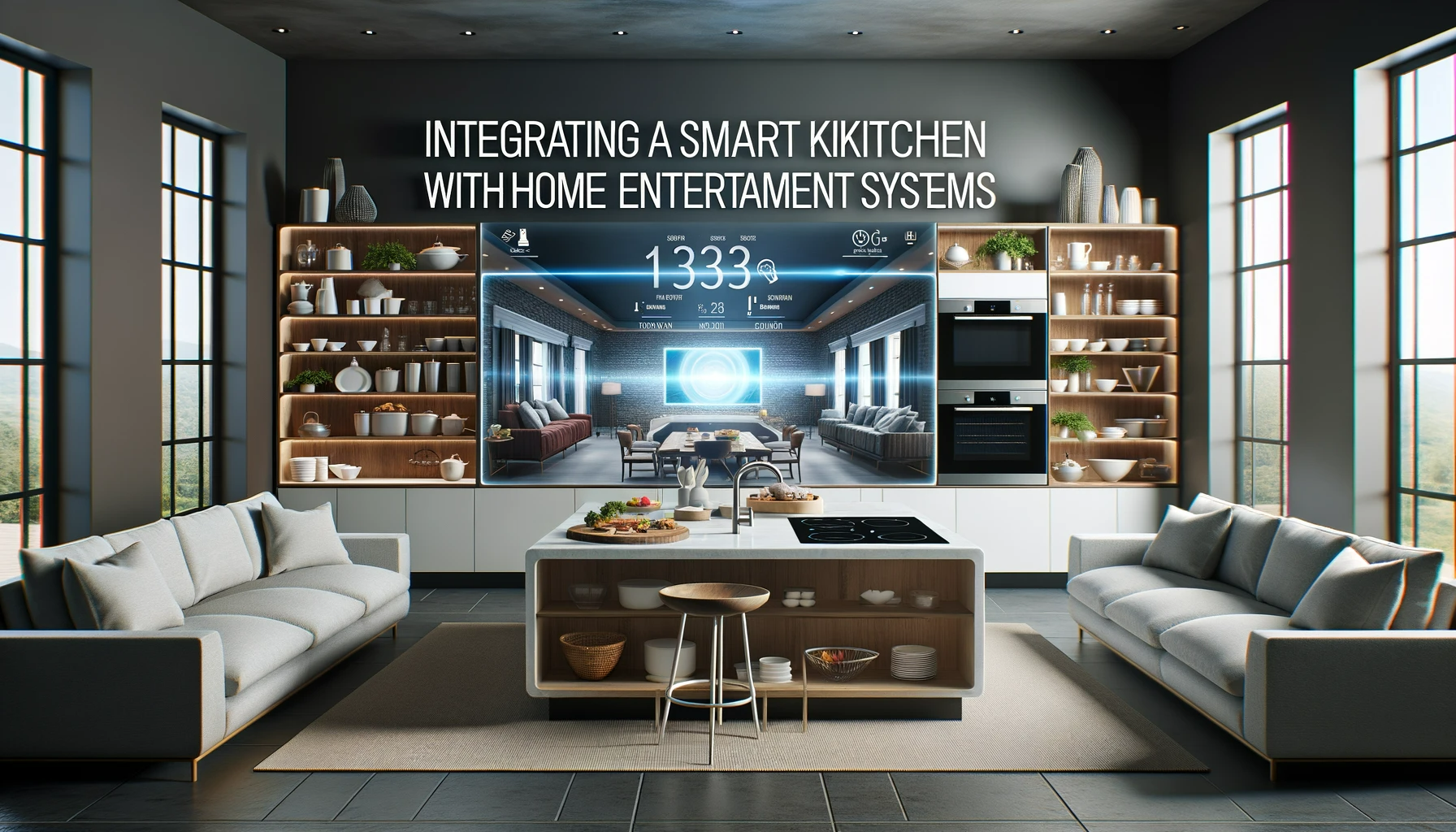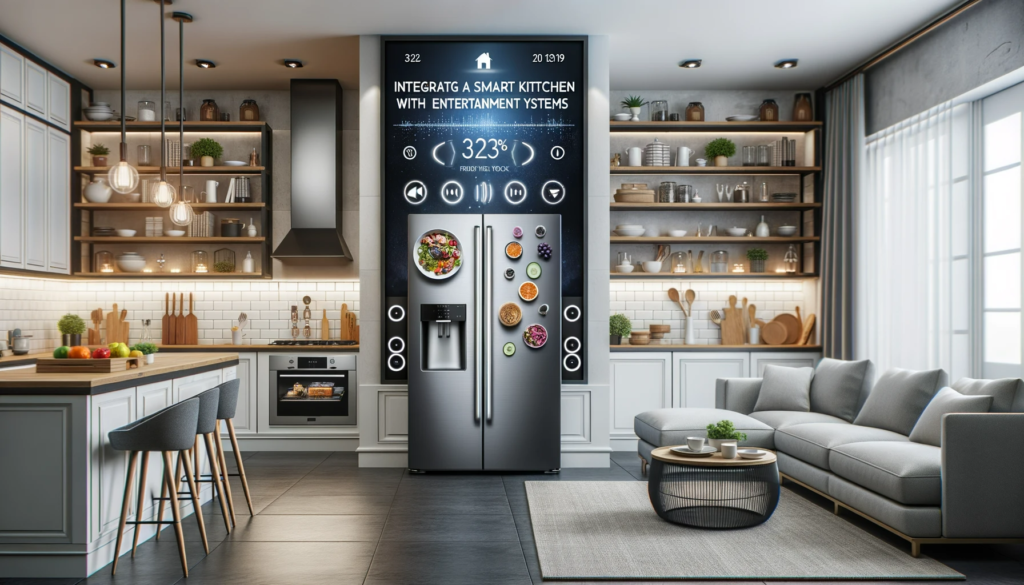Imagine Integrating A Smart Kitchen With Home Entertainment Systems a world where you can prepare delicious meals while catching up on your favorite TV shows or listening to your favorite music. Well, that world is no longer just a dream. With advancements in technology, it is now possible to integrate a smart kitchen with your home entertainment systems.
From voice-controlled devices that can turn on your TV and adjust the volume to smart appliances that can sync with your music playlist, the possibilities are endless. In this article, we will explore the exciting concept of merging the heart of your home with the source of entertainment, creating a truly immersive and convenient experience. Get ready to revolutionize the way you cook and entertain with the integration of a smart kitchen and home entertainment systems.
Smart Kitchen Technology
Benefits of a Smart Kitchen
In today’s fast-paced, technology-driven world, the concept of a smart kitchen has gained significant popularity. A smart kitchen refers to a kitchen that is equipped with advanced appliances and devices that are interconnected and can be controlled remotely. The benefits of having a smart kitchen are numerous. Firstly, it offers convenience and ease of use. With smart appliances, you can control various functions such as temperature, timing, and settings with just a few taps on your smartphone or voice commands. This means you can start preheating your oven or brewing your morning coffee even before you step into the kitchen.
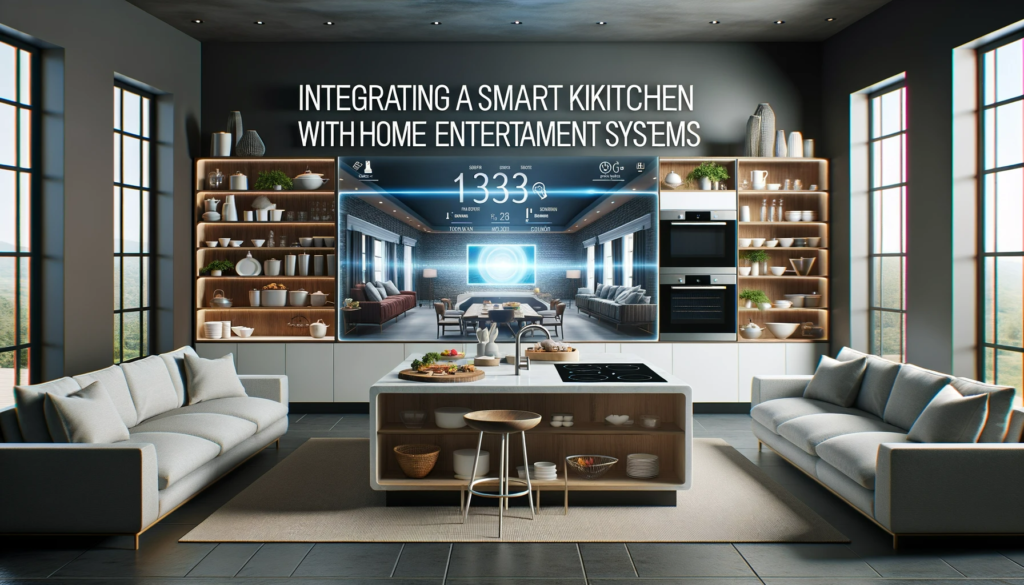
Another advantage of a smart kitchen is energy efficiency. Smart appliances are designed to consume less energy while providing the same level of functionality. For example, smart refrigerators are equipped with sensors that automatically adjust the temperature based on the food stored inside, optimizing energy usage. This not only reduces your carbon footprint but also saves you money on utility bills in the long run.
Furthermore, a smart kitchen can enhance the cooking experience by providing access to a wide range of recipes and cooking techniques. Smart appliances often come with built-in recipe databases, allowing you to explore new culinary horizons effortlessly. Moreover, some smart ovens are equipped with advanced features such as steam cooking and temperature probes that ensure perfect results every time.
Types of Smart Kitchen Appliances
The range of smart kitchen appliances available in the market is expanding rapidly. From smart refrigerators to intelligent coffee makers, there is a smart appliance for every kitchen need. Here are some of the most popular types of smart kitchen appliances:
- Smart Refrigerators: These refrigerators come with built-in touch screens and cameras that allow you to view the contents of your fridge remotely. Some models even have voice recognition technology, enabling you to add items to your shopping list by simply speaking the words.
- Smart Ovens: These ovens offer a variety of features such as Wi-Fi connectivity, recipe integration, and advanced temperature control. With a smart oven, you can preheat your oven on your way home, monitor cooking progress from your smartphone, and receive notifications when your meal is ready.
- Smart Coffee Makers: These coffee makers can be controlled remotely, allowing you to have a fresh cup of coffee waiting for you when you wake up in the morning. Some models can even be programmed to brew coffee at specific times of the day.
- Smart Dishwashers: These dishwashers can be operated using your smartphone, making it convenient to start or monitor a wash cycle from anywhere in your home. Some models also have sensors that can detect the level of dirtiness in your dishes and adjust the cleaning cycle accordingly.
Smart Kitchen Automation
One of the key features of a smart kitchen is automation. Smart kitchen automation refers to the ability of appliances and devices to work together seamlessly, creating a connected and synchronized cooking experience. With smart kitchen automation, you can set up a series of actions or routines that will be triggered based on specific conditions or commands. For example, you can create a routine that turns on the lights, preheats the oven, and starts playing your favorite cooking playlist as soon as you say, “Hey, Google, it’s time to start cooking.”
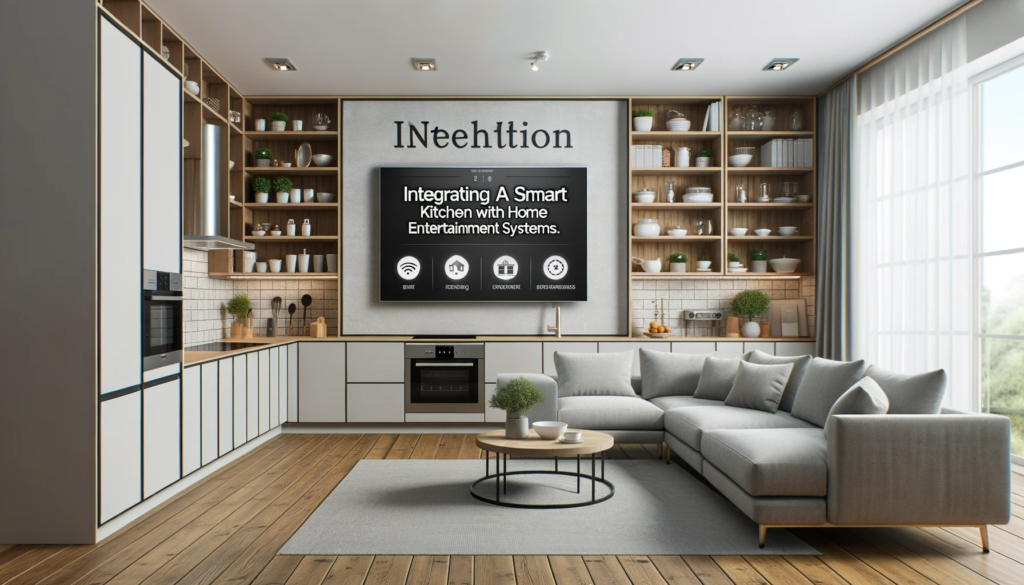
Smart kitchen automation can be achieved through various technologies such as voice assistants and smart hubs. Voice assistants like Amazon Alexa and Google Assistant can be integrated with smart appliances, allowing you to control them using voice commands. Smart hubs, on the other hand, act as a central control point for all your smart devices, enabling them to communicate and interact with each other.
Integration with Home Entertainment Systems
The integration of a smart kitchen with home entertainment systems is a game-changer when it comes to creating a truly immersive and enjoyable cooking experience. With the integration of smart kitchen technology and home entertainment systems, you can combine the pleasure of cooking with the joy of entertainment.
Home Entertainment Systems
Overview of Home Entertainment Systems
Home entertainment systems encompass a wide range of devices and technologies that are designed to provide an immersive and cinematic audio-visual experience within the comfort of your own home. From high-definition televisions to surround sound systems, these systems aim to recreate the atmosphere of a movie theater or a concert hall in your living room.
Types of Home Entertainment Systems
There are several types of home entertainment systems available in the market to suit varying preferences and budgets. Here are some popular types:
- Television and Soundbar Systems: This is the most basic and common type of home entertainment system. It typically consists of a high-definition television and a soundbar or a set of speakers.
- Home Theater Systems: A home theater system includes a large-screen television or a projector, along with a surround sound system that includes multiple speakers strategically placed around the room.
- Media Streaming Systems: These systems focus on providing access to a wide range of digital content such as movies, TV shows, and music through streaming services. They typically consist of a media player or a streaming device connected to your television.
- Gaming Systems: Gaming enthusiasts can enjoy a dedicated gaming system that includes a gaming console, high-performance graphics, and immersive sound systems.
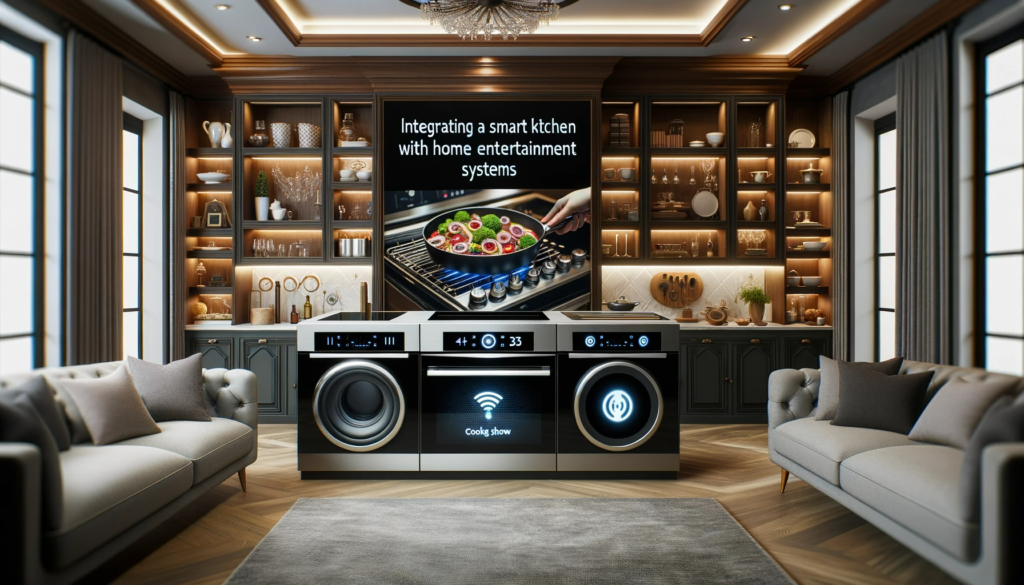
Features and Benefits
Home entertainment systems offer a plethora of features and benefits that enhance your overall audio-visual experience. Some common features include:
- High-definition and 4K Displays: The latest televisions and projectors offer stunning picture quality with vibrant colors and sharp details, allowing you to enjoy movies and shows in the highest resolution available.
- Surround Sound: With a surround sound system, you can experience a true cinematic audio experience. The speakers placed strategically around the room provide an immersive soundstage, making you feel like you’re in the middle of the action.
- Streaming Services: Many home entertainment systems come with built-in streaming capabilities, giving you access to popular streaming services like Netflix, Hulu, and Amazon Prime Video. This allows you to enjoy a wide range of movies, TV shows, and music whenever you want.
- Gaming Experience: Gaming systems provide an enhanced gaming experience with high-quality graphics, realistic sound effects, and immersive gameplay. You can play your favorite video games on a big screen with surround sound to create an immersive gaming environment.
Integration with Smart Kitchen
The integration of smart kitchen technology with home entertainment systems opens up a world of possibilities and takes your cooking experience to the next level. By seamlessly connecting these two systems, you can create a harmonious and enjoyable environment in your kitchen.
Integration of Smart Kitchen and Home Entertainment Systems
Advantages of Integration
Integrating a smart kitchen with home entertainment systems offers several advantages. Firstly, it allows you to multitask efficiently by providing entertainment options while you’re cooking. Instead of standing in silence or listening to background noise, you can enjoy your favorite TV shows, movies, or music without needing to leave the kitchen.
Moreover, the integration of these systems enables you to manage and control both your kitchen appliances and home entertainment devices from a single platform. You can use your voice assistant or a smartphone app to adjust the volume, play/pause content, or change the channel without having to switch between different devices or remotes.
Another advantage is the synchronization of actions based on your preferences. For example, you can set up a routine that automatically lowers the volume of your entertainment system when the timer on your smart oven goes off, indicating that your meal is ready. This ensures that you never miss a moment of your favorite TV show or movie while cooking.
Technologies for Integration
To achieve seamless integration between your smart kitchen and home entertainment systems, certain technologies come into play. The key technologies involved are:
- Wireless Connectivity: Both smart kitchen appliances and home entertainment systems need to be connected to the same Wi-Fi network to communicate and interact with each other. This allows data and commands to be exchanged between the devices effortlessly.
- Voice Assistants: Voice assistants such as Amazon Alexa, Google Assistant, or Apple Siri act as a central control point for both your smart kitchen appliances and home entertainment systems. By integrating them into your ecosystem, you can issue voice commands to control various aspects of your kitchen and entertainment devices.
- Smart Hubs: Smart hubs like Samsung SmartThings, Apple HomeKit, or Google Nest Hub can be used to connect and manage multiple smart devices in your home. These hubs enable communication and coordination between your smart kitchen appliances and home entertainment systems, creating a single interface for control and automation.
Steps to Integrate
Integrating your smart kitchen with home entertainment systems may require a few simple steps to ensure a seamless connection and synchronization. Here’s a step-by-step guide to help you integrate these systems:
- Check Compatibility: Ensure that both your smart kitchen appliances and home entertainment systems are compatible with wireless connectivity and can be integrated with voice assistants or smart hubs. Check the user manuals or manufacturer’s website for compatibility information.
- Set up Wireless Connectivity: Connect all devices to the same Wi-Fi network by following the instructions provided by the manufacturers. This is usually done through a dedicated app or menu settings on the devices.
- Configure Voice Assistants or Smart Hubs: Set up your voice assistant or smart hub to recognize and control both your smart kitchen appliances and home entertainment systems. This typically involves linking the devices to your voice assistant or smart hub account using the respective apps.
- Create Routines and Automations: Take advantage of the automation features offered by your voice assistant or smart hub to create routines and automations that synchronize actions between your smart kitchen and home entertainment devices. For example, you can create a routine that turns off the television when you say, “Alexa, it’s time to start cooking.”
Managing and Controlling the Systems
Once your smart kitchen and home entertainment systems are integrated, managing and controlling them becomes effortless. You can use voice commands or smartphone apps to control various functions of your kitchen appliances and entertainment devices.
With voice commands, you can adjust the volume, change channels, play/pause content on your home entertainment system while you’re cooking. You can also control your smart kitchen appliances by asking your voice assistant to preheat the oven, set timers, or start the coffee maker.
If you prefer a more visual approach, you can use smartphone apps to manage and control your smart kitchen and entertainment devices. These apps provide an intuitive interface that allows you to monitor the status of your appliances, adjust settings, and even receive notifications or alerts.
Enhancing Cooking Experience
Smart Recipe Suggestions
One of the remarkable features of a smart kitchen is the ability to provide recipe suggestions based on the ingredients you have on hand. Smart kitchen appliances that are integrated with recipe databases or connected to food delivery services can suggest recipes that match the ingredients available in your pantry or refrigerator. This eliminates the need to search for recipes manually and opens up a world of culinary possibilities, allowing you to experiment with new dishes and flavors.
Moreover, smart kitchen appliances can provide step-by-step instructions and tutorials for cooking different recipes. Some appliances even offer video demonstrations or interactive guides that walk you through the cooking process, ensuring that you achieve the best possible results.
Entertainment Options while Cooking
Integrating a smart kitchen with home entertainment systems brings entertainment options right into your cooking space. While preparing meals, you can enjoy your favorite TV shows, movies, or music without the need for additional devices or distractions. With streaming services and smart televisions, you can access a vast library of entertainment content and create a personalized entertainment experience while you chop, sauté, and stir.
Syncing Kitchen and Entertainment Devices
To fully enhance your cooking experience, it is essential to sync your kitchen and entertainment devices seamlessly. By doing so, you can achieve greater convenience and customization. For example, you can sync your smart kitchen appliances with your streaming devices so that the volume automatically adjusts when the oven timer goes off. This ensures that you never miss a crucial moment of your favorite show or movie, even in the midst of culinary creations.
Future Developments and Trends
Voice Assistant Integration
With the growing popularity of voice assistants, integration with smart kitchen appliances and home entertainment systems is likely to become even more widespread. Voice assistants are constantly improving and becoming more sophisticated, allowing for more natural and intuitive interactions. In the future, we can expect to see voice assistants becoming an integral part of our cooking and entertainment experiences, making it even easier to control and manage our smart kitchen and home entertainment devices.
Artificial Intelligence in the Kitchen
Artificial intelligence (AI) has the potential to revolutionize the way we cook and interact with our smart kitchen appliances. AI-powered devices can learn your cooking preferences, adapt to your needs, and even suggest personalized recipes based on your dietary preferences and restrictions. Imagine a smart oven that knows your preferred level of doneness for steak or a coffee maker that brews your perfect cup of coffee every morning without you having to set any parameters. The possibilities are endless, and AI has the potential to make our cooking experiences more efficient and enjoyable.
Wireless Connectivity and IoT
As wireless connectivity and the Internet of Things (IoT) continue to advance, we can expect to see more seamless integration between smart kitchen appliances and home entertainment systems. Wireless connectivity allows for easier and more flexible installation and control, eliminating the need for wired connections. With IoT, all our devices can communicate with each other effortlessly, creating a truly interconnected and intelligent ecosystem within our homes.
Augmented Reality Experiences
The integration of augmented reality (AR) technology with smart kitchens and home entertainment systems has the potential to revolutionize the way we experience cooking and entertainment. Imagine wearing AR glasses that overlay virtual recipe instructions onto your kitchen countertop or project holographic images of your favorite actors in your living room while watching a movie. Augmented reality can bring an added layer of interactivity, immersion, and excitement to our cooking and entertainment experiences, blurring the line between the real and the virtual.
In conclusion, integrating a smart kitchen with home entertainment systems offers numerous benefits, including convenience, energy efficiency, and an enhanced cooking experience. With the right technologies and proper integration, you can control and manage both your kitchen appliances and home entertainment devices seamlessly, creating a harmonious environment that combines the pleasures of cooking with the joys of entertainment. As future developments and trends continue to shape the world of smart homes, we can look forward to even more exciting possibilities and innovations in the space of smart kitchen technology and integration with home entertainment systems.

